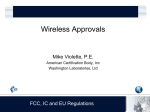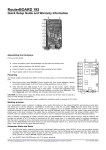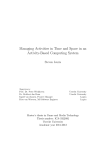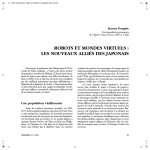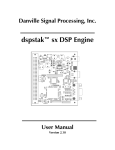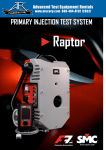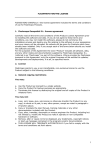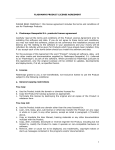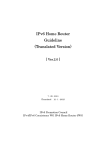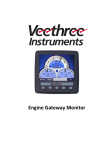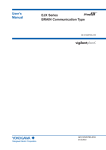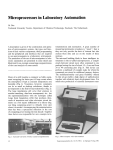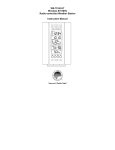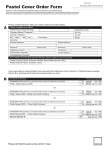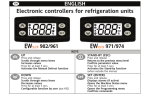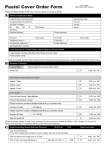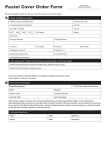Download Technical standards on telecommunication terminal devices
Transcript
4 March 2015 Mitsuhiro Kawasaki Telecommunication & Technology Systems Section, General Telecommunications Base Station Kawasaki, MIC 1.Overview of certification system of telecommunication terminals 2.Laws and ministerial orders on certification system of telecommunication terminals 3.Technical standards on telecommunication terminal devices 4.Market surveillance on terminal devices 5.Technical standards on emergency notification are not appropriate 1 1. Overview of certification system of telecommunication terminals 2 Certification system on telecommunication terminals (1) ○ Certification system is a system that should be used by choice by the user who checks the display if it is a display that is certified. ○ Under the Telecommunication Business Act, certification system based on the three rules was certified as a technical standard on connecting terminals. Technical standards on connection to terminals of the Telecommunication Business Act(Telecommunication Business Act Article 52, Regulations on Terminals) 【General rules】 ⇒ Prevent damages and functional problems on telecommunication lines ⇒ Prevent problems from other users ⇒ Clarify where responsibilities end at telecommunication lines Terminals technical standard compatibility test by telecommunication business or Certification system Terminals Mark indicates compatibility with technical standard 3 Certification system on telecommunication terminals(2) ○ In design certification by a registered certification body, registered certification body certifies whether a device design is compatible with the technical standards, and certification vendor gets the terminal device to satisfy the technical standards by building a terminal device to match the design. Method to check satisfaction of technical standards (Certification by each device) ① Technical Standards Compatibility Certification (Article 53 Section 1) ③ Self-check of satisfaction of technical standards by importer or manufacturer(Article 63) *Registered certification body approves the checking method Filing enterprise checks it *Filing enterprise files the method of checking with the MIC Minister Registered certification body certifies it Filing enterprise checks it Technical standards (Check the design) Registered handler business checks it Device is designed ② Design certification by registered certification body (Article 56) Terminal device (Certify the design) Registered certification body approves it 4 Certification system on telecommunication terminals(3) Method to check satisfaction of technical standards ① Technical standards compatibility certification by registered certification body (Article 53 Section 1) (Certify design) ③ Self-check of satisfaction of technical standards by importer or manufacturer(Article 63) Performance duties Duty to create and retain inspection records (Check design) Display by registered certification body’s duty (Article 53 Section 2) Design alignment duty ② Design certification by registered certification body (Article 56) Compatible with technical standards (Certification by each device) Duty to display Display by certifying vendor is possible (Article 58) Display by filing vendor is possible (Article 65) Effect of display With display No need to get inspected by telecomm vendor on connectivity 5 (Article 69 Section 1) ○ Users of terminal devices checks compatibility with technical standards via (1)~(3) below, and devices given a display do not need to receive inspection on connectivity by a telecomm vendor before connecting to datalines. 5 Standards certification system on telecomm devices(4) Case on required documentation for certification and approval 1 Device overview document Material that explains name, usage, structure, functions, and overview of specifications of a device. 2 Prototype device result report(when test by registered certification body is not done) Materials describing compatibility with technical conditions and technical standards which also contains the following compatibility test results (1) Measuring devices that were calibrated in accordance with Telecommunication Business Act (Article 87 Section 1 Paragraph 2) (2)Tests conducted by a test method that is indicated by MIC Minister for each technical standard or a similar better method. 3 External diagram Diagram that describes the dimension, appearance, and structure of the device. 4 Connections schematic Diagram that describes the connections structure of each functional block for each circuit structure for the device, and diagram that describes the method of connecting datalines to this terminal device which is connected to other devices. 5 Block diagram Diagram that describes the structure of the circuit in the device. 6 Operation manual Material that explains the method of operation and handling the device. 7 Document on method of checking(Material needed when requests are made concerning design certification of a terminal device) Material that records the method to check that all terminal devices based on the relevant design do match the relevant design (Certification Rule, Appendix No 3) Item to describe in the check method document(Certification rules, appendix no 3) Materials explaining the following items that must be explained. 1 Authority and responsibility of a manager and the organization 2 Management method to perform the duty to align with the design. 3 Inspection of terminal devices 4 Management of measuring devices 5 Materials needed to perform the duty to align with the design. 6 Overview of Mutual Recognition Agreement (MRA) with other countries What is MRA? ○ Mutual Recognition Agreement (MRA):System to accept mutually between Japan and another country the results of evaluating compatibility with technical standards of a telecomm device. ○ With regard to telecomm devices to date, MRA was signed and operating with Europe (effective Jan 2002), Singapore (effective Nov 2002), and with the US (effective Jan 2008). Before MRA After MRA 【Outside Japan】 【Japan】 When device for overseas will be exported, one needs to go overseas and apply. (requires time and cost) Manufacturers 【Outside Japan】 Application overseas becomes doable from Japan Cutting cost and timeframe Compatibility evaluation body ①Application 【Japan】 ②Compatibility evaluation ③Export Market overseas Compatibility evaluation body ②Compatibility evaluation ①Application Overseas standards are inspected in Japan Manufacturers ③Export Market overseas 7 2. Laws and ministerial orders on certification system of telecommunication terminals 8 Laws and ministerial orders on telecommunication devices ○ These are established in the rules on certification of technical standards compatibility of terminal devices and rules on terminals in the Telecommunication Business Act and related laws and ministerial ordinances. Telecommunication Business Act Chapter 1 General rules(Articles 1 to 5) Chapter 2 Telecommunication Business(Articles 6 to 116) Section 4 Telecommunication facilities(Articles 41 to 73) Part 2 Connection to terminal facilities(Article 52) (Article 53 to 73) Part 5 Designated testing bodies(Articles 74 to 105) Part 2 Registered certification body(Articles 86 to 103) Part 3 Certification approving body(Articles 104 to 105) Chapter 3 Use of land(Articles 117 to 143) Chapter 4 Telecommunication Dispute Resolution Committee (Articles 144 to 162) Chapter 5 Other rules(Articles 163 to 176) Chapter 6 Penalty(Articles 177 to 193) Related laws and ministerial ordinances to the Telecommunication Business Act Rules on terminals (technical standards) ①General rules ②Categories of responsibility ③Safety ④Terminals connected to telephone facilities ⑤Terminals connect to wireless calling facilities ⑥Terminals connected to general digital communication facilities ⑦Terminals connected to dedicated data lines or to digital data transmission facilities Rules on certification of device terminals for compatibility to technical standards ①General rules ②Terminals to be certified for compatibility to technical standards ③Design certification and certification of compatibility with technical standards which are conducted by a registered certification body (Inspection items, display format, and items in various filings) 9 Overview of provisions of the standards certification system The following items are mainly set forth in the provisions in the standards certification system of the Telecommunication Business Act. Articles of the Telecommunication Business Act Description Articles 53 Duty to display when technical standards compatibility certification is done Prohibiting unclear displays Articles 54, 55, 60, 166, 167 Authority of the MIC Minister with respect to certification vendors (order to prevent interference, prohibiting a display, collecting reports, onsite inspection) Articles 56 to 59 Duty of certification vendors and explanation of design certification (Design satisfaction duty and retention of test records, etc) Article 61 Application of this mutatis mutandis to terminal devices whose design was certified and to certification vendors Article 62 Application of this mutatis mutandis to non-Japanese vendors. Articles 86 to 90 Technical standards compatibility self-check system Articles 97 to 102 Criteria on registering registered certification bodies Articles 91 to 96 Duties of a registered certification body Articles 97 to 102 Authority of the MIC Minister with respect to registered certification bodies (Onsite inspection, rectification orders, etc) Articles 103 How it is applied mutatis mutandis when the registered certification body will certify the design. Articles 104 and 105 Certification approving body 10 Provisions applied to registered certification bodies and their description The following provisions are applied to registered certification bodies that are registered under the Telecommunication Business Act Articles of the Telecommunication Description Business Act Article 53 Section 1 Inspection of technical standards compatibility certification Article 53 Section 2 Duty to display when technical standards compatibility gets certified Business categories into which certified body can register itself and items to complete in the Article 86 application Article 87 Standards on registration with MIC and items on disqualification Article 88 Updating your registration (5 years) Article 90 Filing when names are changed and announcement to the public of bodies that were registered Article 91 Section 1 Duty to perform inspections of technical standards compatibility without delay. Inspection method(This is set forth under “Rules on technical standards compatibility Article 91 Section 2 certification for terminal devices”)Standards on certifying professionals. Article 92 Report to MIC on certified devices Article 93 Filing that is done when directors are appointed or released Article 94 Creation of business rules Article 95 and 96 How to keep financial books and statements Article 97 and 98 Instruction of MIC to certification bodies Article 99 Filing that is done when business will stop or be dissolved. Article 100 and 101 Standards on cancellation of registration and removal of registration by MIC Article 103 Mutatis mutandis application of other rules Article 166 Section 5 Onsite inspection by MIC of the certification body 11 Provisions applied to certified parties and description The following provisions under the Telecommunication Business Act are applied under the MRA or by Japan’s certifying body to non-Japanese parties overseas that are certified by a certifying body that does certification work for Japan Provisions of the Telecommunication Business Act Description Article 54 Order to prevent interruption Article 55 Section 1 When construal is made that no display is attached Article 57 Section 1 Duty of alignment with design Article 57 Section 2 Duty to retain inspection records Article 58 Display rules Article 59 Measures and orders Article 60 Section 1 Prohibiting a display Article 61 Mutatis mutandis application (when construal is made that no display is attached, order to prevent interruption) Article 62 Sections 2 and 3, Article Non-Japanese vendor (Submit terminal device, order to prevent 167 Section 6 interruption, order to take action, prohibiting a display) Article 166 Sections 2 and 3 Onsite inspection and collect report Article 167 Section 1 Submit terminal devices 12 Duty to retain inspection records and duty to align with the design ■ Duty to align with the design 【Telecommunication Business Act Article 57 Section 1】 Person who is certified by a certification body (the certified vendor) has a duty to align the terminal device to the design when it will handle the terminal device that was created based on a design that was certified. ■ Duty to retain inspection records 【Telecommunication Business Act Article 57 Section 2】 ■ Certified vendor shall inspect terminal devices that it will handle, create inspection logs on it, and retain them, in accordance with the Method of Checks (method on quality control) that is certified, in order to perform the above duty. ■ Inspection record items are as follows and they shall be kept for 10 years from the date of inspection 【Article 21 of the rules on technical standards compatibility certification of terminal devices】 ① Design certification number tied to the inspection ② Date and location of inspection ③ Name of person responsible for inspection ④ Inspection method ⑤ Inspection result 13 Display to indicate devices that are certified Display 【Telecommunication Business Act Article 58】 ■ Certified vendors can attach a display to say that it satisfies the standards on its devices when the duty to align with the design and duty to retain inspection records are performed. ■ Display format 【Rule on technical standards compatibility certification of devices, format no 7】 T AD 14 0001 000 Device type Year Serial no Registered certification body no ■ Display must be put in a readable spot or be displayable by an electromagnetic method. 【Rule on technical standards compatibility certification of devices, Article 22】 ■ For devices that has no area to show the Mark, you can attach it in a readable spot on the packaging or vessel or in the user’s manual. 【Rule on technical standards compatibility certification of devices, Article 22】(Enacted 9/1/2014) ■ Devices to which a display is attached in accordance with procedure will be given the specific effect under law as described. (Effect: Connection to a telecommunication network) * Handling of the Mark when the device is modified ■ As a rule, certified vendors shall obtain a new certification from the certifying body when it changes a part or all of the design specifics of a device. ■ When a new certification is obtained, you will get a new number. 14 Display by electromagnetic method (enacted 2.28.2010) ○ The display to indicate that it meets the technical standards which used to be attached to an area that is easy to see on the terminal device (called “the Mark”) can be recorded electromagnetically on device terminals with a screen and shall be displayed on the screen. (electronic labeling) Issues with this Mark ●Cell phone handsets have the certification display that it meets relevant technical standards (Mark, Bluetooth logo, etc) in the space that holds the battery pack. ●Lack of space to put the mark due to rapid advances in miniaturization, multifunctionality, and increased complexity of all telecommunication devices including cell phone handsets. <<Electromagnetic display examples that meet technical standards Inclusion of a display by using an electromagnetic method ●Lack of space to attach the Mark is resolved by introduction of a method that uses an electromagnetic method. ●Easier to check the display than right now where the Mark is attached. ② Display examples ① Operation examples 15 Partial amendment to rules on technical standards compatibility certification for terminal devices(Enacted 9/1/2004) 1 Transfer of display that indicates technical standards compatibility (Transfer of display on compatible display terminal device that is inside a product) • Manufacturer of a product that is in a wireless module that was certified on technical standards compatibility can transfer the display of technical standards compatibility that is attached to this wireless module onto another product. (Telecommunication Business Act, Article 68 Section 2) → User can now check the state of compatibility to technical standards from outside of a product and can use the product therefore with piece of mind. * Display of technical standards compatibility certification Terminal device display to tell you that this is compatible with the technical standards (connectivity with networks) as set forth by the Telecommunication Business Act. Requirements to be exempted from inspection when the terminal device is connected to a network of a telecomm vendor. Wireless modules and PC mounted with wireless modules *The following is set forth in the ministerial ordinance. ○ When the display will be put in a product with a compatible display terminal device, after one check that it is attached to the compatible display terminal device that is in the product by visual check or other appropriate method provided hereunder: ① Method of attaching it to a place that is visible on the product that has the compatible display terminal device built in. ② Method to display electronically the product into which the compatible display terminal device is built in. In this case, the user’s manual shall describe that the display is electronic and the method of display. 16 Collection of report and order for onsite inspection and interference prevention order Onsite inspection at certified vendor 【Telecommunication Business Act, Article 166 Section 2 and 3】 The MIC Minister may make the certified vendor report on the terminal device that was certified, or make its staff perform a onsite inspection of the offices of the certified vendor to inspect the device and other properties, in order to perform this law. ■ If you refuse to report or file a false report, you may be penalized to a maximum of 300,000 Yen. ■ Submission of terminal device 【Telecommunication Business Act, Article 167】 After an onsite inspection by MIC staff, the MIC Minister order the certified vendor to submit the relevant device or relevant property by a particular time when there is a device that is found to be very difficult to inspect at the location where it is, or there is a property that is needed in particular to perform the inspection of the relevant device. ■ If you violate the order, you may be penalized to a maximum of 300,000 Yen. ■ Order to prevent interference 【Telecommunication Business Act, Article 54】 ■ When a terminal device that was certified is not given a display and is not compatible with the technical standards, and there is a concern that the usage of this device may create interference on telecommunication of other users who will use the datalines, and when the MIC feels a particular need to prevent the aggravation of this interference, the MIC Minister may order the certified vendor to perform necessary actions to prevent the aggravation of the interference by this device. ■ If this order is violated, there will be a maximum sentence of 1 year or a penalty of a maximum of 1 million Yen. And a corporation penalty in addition of maximum 100 million Yen. 17 3. Technical standards for telecommunication device terminals 18 Application of technical standards to telecommunication terminal devices Under the Telecommunication Business Act, there are technical standards for terminal devices connecting to datalines that they will not create problems for other users or damage the dataline facilities. Even if the terminal device is one that connects to dataline facilities via radio wave, there is a need to satisfy the technical standards under the Telecommunication Business Act in addition to the Radio Acts. Primary telecommunication method to connect to dataline facilities via radio waves TDMA CDMA W-CDMA CDMA2000 VoLTE W-CDMA (HSPA) CDMA2000 (1xEV-DO) LTE WiFi WiMAX XGP Type of telecommunication terminal device under the Telecommunication Business Act and signal Type of terminal devices Sign al Terminal devices connected to mobile telephone facilities and analog telephone facilities. A Terminal device that is connected to IP telephone facilities E Terminal devices that are connected to IP cell phone facilities. F Terminal devices that are connected to wireless calling facilities B Terminal devices that are connected to general digital telecommunication facilities. C Terminal devices that are connected to digital data transmission facilities and dedicate datalines. D 19 History of categories of technical standards compatibility certification H23(2011).4.1 ~H23(2011).3.31 Type of terminal device Terminal device connected to telephone facility Terminal device connected to wireless calling facility Terminal device connected to general digital telecommunication facility Terminal device connected to dedicated dataline facility or digital data transmission facility DRouter with VoIP adapter function DRouter A VoIP adapter IP telephone A IP telephone IP telephone(category Mobile telephone 「E」added) emergency notification function Initially 4 categories A Analog telephone B C D Telephone terminal Sign al A Terminal device connected to analog telephone facility or mobile telephone facility A E Terminal device connect to internet protocol telephone facility E Terminal device connected to wireless calling facility B Terminal device connected to internet protocol telephone facility F Terminal device connected to general digital telecommunication facility C Terminal device connected to wireless calling facility B C Terminal device connected to dedicated dataline facility or digital data transmission facility D Terminal device connected to general digital telecommunication facility Terminal device connected to dedicated dataline facility or digital data transmission facility D Type of terminal device Sign al Terminal device connected to analog telephone facility or mobile telephone facility Terminal device connected to internet protocol telephone facility Data+IP telephone Router with VoIP adapter function AD DE Telephone terminal Telephon e terminal IP mobile telephone(category VoLTE 「F」added) Type of terminal device Sign al A H25(2013).3.28 D Router Mobile telephone + data AD Mobile telephone+ data Display example(case of 3G+ VoLTE) Type of terminal device A Analog telephone EIP telephon e E VoIP adapter A Analog telephone Mobile telephone+data + IP cell phone T ADF 13 0001 001 AD F IP telephone ※The types of terminal devices in the figure are abbreviated because of the column space. 20 Description of rules on technical standards in the terminal facility rules ① Specific examples of terminal devices and technical standards (General standards sought by terminal facilities) Chapter 1 General rules(Articles 1 and 2) Chapter 2 Category of responsibilities(Article 3) Chapter 3 Safety(Articles 4 to 9) (Rules on individual terminal facilities) Chapter 4 Terminal facility to connect to telephone facility Section 1 Analog telephone terminals (Article 10 to 16) Section 2 Cell phone handset(Articles 27 to 32 Section 3 IP telephone terminal (Article 32-2 to Article 32-9) Section 4 IPcell phone terminal Safety ・Prohibit classification of telecommunication that will leak・Wiring・Terminal facility that use radio waves at the terminal facility Analog telephone ・Basic function・Outward transmission function・Conditions on signal selection・Emergency notification function・Electrical conditions on direct current circuits・Transmission power・Crosstalk attenuation Mobile telephone (telephone), PHS ・Basic function・Outward transmission function・Outward transmission timing・Random access control・ Position registration control・Function to follow channel switching instruction・Function to stop outward transmission・Function to stop outward transmission automatically when inward transmission level deteriorates・Function to stop outward transmission automatically when there is breakdown・Function to secure important communications・Emergency notification function・Function to prevent changes to information unique to mobile telephone terminal IP telephone(0AB-J) ・Basic functions・Outward transmission function・Identification information registration・[Illeg] notification function・Emergency notification function・Electrical conditions・Transmission power when communicating with analog telephone terminals VoLTE Chapter 5 Terminal facility that is connected to the wireless calling facility(Articles 33 and 34) Chapter 6 Terminal facility connected to general digital telecommunication facility(Articles 34-2 to 34-7) Chapter 7 Terminal facility connect to dedicated facility or data telecommunication facility(Article 34-8 to Article 34-9) *It is included in the LTE data communication too Chapter 8 Special terminal facility(Article 35) (Other) Chapter 9 Self regulated telecommunication facility(Article 36) ・Basic function ・Outward transmission function ・Outward transmission timing ・Random access control ・ Position registration control ・Function to follow channel switching instruction ・Function to stop outward transmission ・Function to stop outward transmission automatically when inward transmission level deteriorates ・Function to stop outward transmission automatically when there is breakdown ・Function to secure important communications ・Emergency notification function ・Function to prevent changes to information unique to IP cell phone terminal ISDN terminal ・Basic function・Outward transmission function・Emergency notification condition・Electrical conditions・ Transmission power when communication with analog telephone terminals Mobile telephone(data communication)、router ・Electrical conditions・Crosstalk attenuation 21 Description of rules on technical standards in the terminals rules Rules on terminals Analog telephone Mobile telephone IP telephone IP mobile telephone (eg VoLTE) Wireless calling ISDN Data Basic functions Article 10 Article 17 Article 32-2 Article 32-10 - Article 34-2 - Outward transmission functions Article 11 Article 18 Article 32-3 Article 32-11 - Article 34-3 - Conditions on selecting signals Article 12 - - - - - - Outward transmission timing - Article 19 - Article 32-12 - - - Random access control - Article 20 - Article 32-13 - - - Time alignment control - Article 21 - Article 32-14 - - - Location registration control - Article 22 - Article 32-15 - - - Function that follows channel switching instructions - Article 23 - Article 32-16 - - - Inward transmission level notification function - Article 24 - Article 32-17 - - - Function to follow outward transmission stop instruction - Article 25 - Article 32-18 - - - Automated outward transmission stop function when inward transmission level falls, etc - Article 26 - Article 32-19 - - - Automated outward transmission stop function when broken - Article 27 - Article 32-20 - - - Identification information registration - - Article 32-4 - - - - [Illeg] notification function - - Article 32-5 Article 32-22 - - - Important transmission confirmation - Article 28 - Article 32-21 - - - Emergency notification function Article 12-2 Article 28-2 Article 32-6 Article 32-23 - Article 34-4 - Prevent change to information unique to terminal - Article 29 - Article 32-24 Article 33 - - Electrical conditions Article 13 - - - Transmission power Article 14 Article 30 Article 32-7 Article 32-8 - - Article 34-6 - Crosstalk attenuation Article 15 Article 31 - - - - Article 34-9 Special terminals Article 16 Article 32 Article 32-9 Article 32-25 Article 34 Article 34-7 - Added emergency notification function Connect to IP telephones Article 34-8 Added IP mobile 22 Reference: Types of terminal devices that were added or changed DECT, s PHS [digital cordless telephone standards] (Oct 2010 ~) Conditions and functions to have ・Identification number, carrier sense Dedicated dataline facilities: 1000BASE-T (Apr 2011~) Conditions and functions to have ・Outward transmission voltage Dedicated dataline facilities: XGP (Jul 2011~) Amended conditions and functions ・Outward transmission timing ・Random access control notification function ・Incoming transmission level 920MHz band electronic tag system (Dec 2011~) Conditions and functions to have ・Identification number, carrier sense Next generation high speed wireless LAN (Mar 2013~) Conditions and functions to have ・Identification number, carrier sense 23 Certifications by year of terminal devices Of the 1193 models that were certified by a registered certification body in fiscal 2013, ・ 1032 terminal devices (category D) that are connected to digital data transmission facilities and dedicated dataline facilities. ・ 412 terminal devices (category A) that are connected to mobile telephone facilities and analog telephone facilities. * Categories may overlap H26 Fiscal year H16 H17 H18 H19 H20 H21 H22 H23 H24 H25 (~Nov) Registered certification body 1029 959 942 986 1078 931 869 909 874 1006 582 Self-check 49 59 33 25 17 9 7 24 14 14 7 11 1089 22 1040 41 1016 32 1043 29 1124 23 963 67 943 78 5 1016 81 2 971 170 3 1193 110 7 706 MRA Total EU USA 24 4. Market surveillance on terminal devices 25 About the terminal device market surveillance ○ Surveillance is done to inspect for compatibility by purchasing terminal devices on the market to check to see for compatibility to technical standards that are set forth in the Telecommunication Business Act with regard to terminal devices on the market. ○ This investigation is performed every year to check whether relevant bodies and terminal manufacturers are following the laws and ministerial ordinances, because the inspection of technical standards compatibility inspection on terminal devices are done by bodies that are registered with the government. Investigated content ○Check display (Mark of compatibility with technical standards) ○Compatibility with common standards of terminal devices (prohibit identification of communication that leaks, insulation resistance, wirings, etc.) ○Compatibility with standards set forth by type (analog telephone, cell phone, IP telephone, data communication) *Select so there is no bias on registered certification body or type of terminal device Relationship to certification system Inspection of compatibility to technical standards Manufacturer does Certification of compatibility with technical standards ・Application for design certification *1 Concern that there is inadequacy in the inspection by registered certification body Pass (certified) Mark to indicate compatibility with technical standards(*2) Registered certification body (*1) Manufacturer may also do self-checks. (In either case, inspection is done by a testing method that is in the official notice.) Concern that manufacturer has not manufactured it in alignment with the certified design *2 Back side of cell phone Put on market Inspection by telecomm vendor is not needed for connection to telecomm networks. Concern that manufacturer has not attached the display properly Purchase/i nspection 26 Performance of market surveillance and post-market regulations • MIC will perform onsite inspections at registered certification bodies to see whether certification steps are done correctly. • Actions ex post facto are in place, which include* order to rectify in case of violation of law and ministerial ordinance, and orders such as implementation of necessary measures to prevent aggravation of damages and order to prohibit certain displays. • As part of market survey, MIC shall, via checking the devices, investigate and monitor telecommunication terminals that are improperly certified. (*Telecommunication Business Act, Articles 54, 66, and 68) Market study (Started in 2003) MIC makes random purchases of devices Test to find out whether there is a match to the technical standards If inappropriate device is discovered, instruct supplier (manufacturer or importer) to correct the situation. 27 Primary measures for not satisfying the display and technical standards Measures and orders Minister may order the certified vendor that necessary measures to be taken to improve the method to check as it relates to certification when the certified vendor is found to have violated the duty to align with the design. 【Business Telecommunication Act Article 59】 Action to deem that no display was attached When there is no satisfaction with the technical standards by the certified device onto which the display is attached, the MIC Minister may take action that this device has not been attached a display that tells that there is compatibility to the technical standards when MIC sees that there is a particular need to prevent interferences on telecommunication of other users who will use the telecommunication datalines. 【Business Telecommunication Act Article 55 Section 1】 Action when display is prohibited The MIC Minister may order the certified vendor that attachment of a display on the device be prohibited for a period not more than 2 years in the event any of the conditions below are applicable. 【Business Telecommunication Act Article 60 Section 1】 When devices according to the design are not compatible with the technical standards under the Telecommunication Business Act, it is found that there is a particular need to prevent interferences on the communication of other users who use the datalines. (exclude (6)) ② When there is a violation by the certified vendor of the duty to record and inspect ③ When there is a violation by the certified vendor of the order to take some measures ④ When the certified vendor receives the certification by improper means. ⑤ When a registered certification body certifies in violation of a duty. ⑥ When a technical standard is modified, and it is found that the design that was certified is no longer compatible with the technical standards after its modification to the design. ① ○ The MIC Minister will notify via public notice when it prohibits a display to be attached or it takes action by deeming that no display was attached. 【Telecommunication Business Act, Article 55, Section 2; Article 60 Section 2; and Article 24 of the rule on technical standards compatibility certification of terminal devices】 28 Violation of design matching duty The manufacturer that is a contractor of the certification vendor manufactured a terminal device that was different from the design that was certified. ○ Because the certification vendor did not perform an acceptance test, nobody noticed the design change. ○ Manufacturer Certification vendor Registered certification body 1. Design/testing 2. Application 4. Outsource manufacturing 3. Certification 5.Manufacture/ delivery Unpermitted design change Acceptance test not performed 29 Inappropriate certification ○ As a result of the manufacturer creating an improper test report and tests by incorrect methods, nobody noticed the incompatibility to the technical standards and the certification was completed. Manufacturer Certification vendor Registered certification body 1. Design/testing 2. Application 4. Outsource manufacturing 3. Certification 5.Manufacture/d elivery Incorrect testing Improper reports 30 Names that are different from the time of certification ○ Despite the certification vendor obtained certification on the device for development and changed the name of the device for sale, no amendment filing on the name was submitted. Registered certification body Certification vendor MIC Amendment filing unsubmitted 31 Dissemination of cases on the MIC homepage 【Case of incompatibility with terminal devices】 http://www.soumu.go.jp/main_sosiki/joho_tsusin/tanmatu/futekigou.html 32 5. Incompatibility to technical standards for emergency notifications 33 Dissemination of the testing method on emergency notifications from cell phones ○ At the MRA international seminar in 2012, the following cautions were disseminated about the testing method for emergency notifications on cell phones. 34 Method of transmission of emergency notifications from cell phones ○ There are the following 2 types of transmission in emergency notifications from cell phones. ・Normal setup (normal number transmission) ・Emergency setup (includes emergency service category (police, coastguard, fire department, ambulance)) ○ In transmissions by emergency setup, cell phone has to read the emergency call code (ECC) inside the elementary file (EF) which is on the SIM and then transmit it. Item Emergency Call Code Emergency Service Category Police Coastguard Fire Dept / Ambulance Value Value Value 1 F F 1 0 F 01 1 F F 1 8 F 08 1 F F 1 9 F 06 Case of EFECCinformation in SIM (5 types in Japan) 35 Method of testing for each transmission method ○ In the test, the following items are checked by a base station simulator. ・Normal setup : Check dialed number ・Emergency setup : Check the service category Normal setup Emergency setup 36 Overview of troubles and troubleshooting ○Overview of technical standards incompatibilities Mobile telephone that was incompatible with technical standard was a SIM free terminal, and of the 4 types of compatible SIMs, 2 were transmission by normal setup and other 2 were one that transmit by emergency setup. Not connected to emergency body because the mobile handset did not read the service category from the emergency setup transmission. ○ What’s done to resolve this incompatibility Corrected firmware that reads the service category was released, which made even SIM that transmits via emergency setup to make emergency transmissions. Given the recent incompatibility case, please run an appropriate emergency transmission test at the compatibility evaluation bodies that does certification and manufacturers that make similar SIM free cell phones. Mobiles & smartphones are popular Life or death There are households with no cell phones 37 Announcements on the MIC website 【Certification system for terminal devices】 http://www.soumu.go.jp/main_sosiki/joho_tsusin/tanmatu/ ○ Certification system, related laws and ministerial ordinances ○ List of registered bodies, list of terminals certified as technically compatible ○ Case study of incompatibility 38 ●MIC Website http://www.soumu.go.jp/ ●MIC, Radio Frequency Usage Website http://www.tele.soumu.go.jp/index.htm








































